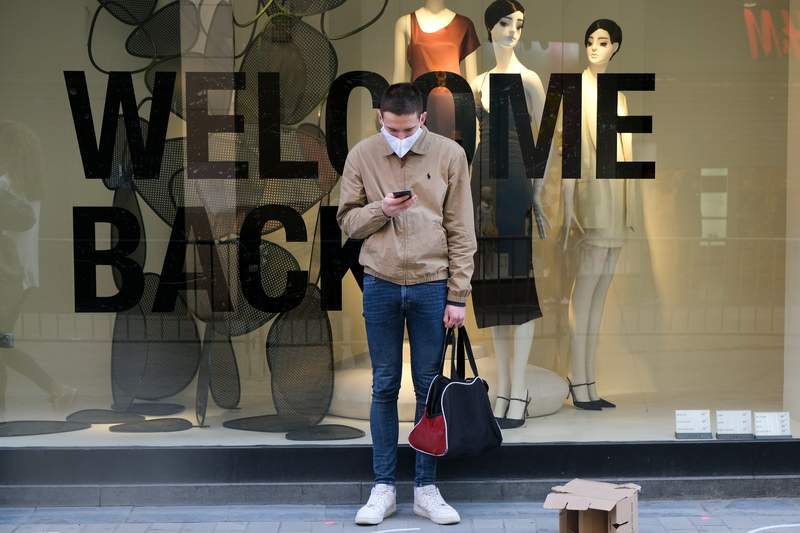By Lucia Mutikani
WASHINGTON (Reuters) - U.S. consumer spending fell for a second straight month in December amid renewed business restrictions to slow the spread of COVID-19 and a temporary expiration of government-funded benefits for millions of unemployed Americans.
The report from the Commerce Department on Friday also showed inflation steadily rising last month. Expectations that inflation would perk up this year were supported by other data showing a solid increase in labor costs in the fourth quarter.
But a rise above the Federal Reserve's 2% target, a flexible average, is unlikely to worry policymakers. The U.S. central bank is expected to maintain its ultra-easy monetary policy stance for a while as the economy battles the pandemic. Excess capacity remains throughout the economy, which could limit companies' ability to raise prices.
"The Fed would like inflation to average 2%, so it would like inflation to temporarily move above 2%," said Gus Faucher, chief economist at PNC Financial (NYSE:PNC) in Pittsburgh, Pennsylvania. "Inflation pressures will remain limited to a few sectors as high unemployment will restrain wage growth."
Consumer spending, which accounts for more than two-thirds of U.S. economic activity, slipped 0.2% last month as outlays at restaurants declined. Spending at hospitals also fell, likely as patients stayed away in fear of contracting the coronavirus.
Households also cut back spending on recreation. Consumer spending tumbled 0.7% in November. Economists polled by Reuters had forecast spending would fall 0.4% in December.
When adjusted for inflation, consumer spending decreased 0.6% last month after dropping 0.7% in November. That likely sets a lower base for consumer spending in the first quarter.
Another drop in January is not expected as states, including New York and California, have started easing pandemic-related restrictions. But outlays on long-lasting manufactured goods, the main driver of spending during the pandemic, fell for a second consecutive month in December. Spending on nondurable goods dropped for a third straight month. Services gained 0.1%.
"Goods spending has clearly rolled over, and we anticipate the pull-forward in demand in the second half of last year will also weigh on consumption of goods at the start of this year," said Tim Quinlan, a senior economist at Wells Fargo (NYSE:WFC) Securities in Charlotte, North Carolina. "We do not anticipate spending to pick up significantly until a vaccine is widely administered."
U.S. stocks fell sharply. The dollar was steady against a basket of currencies. U.S. Treasury prices were mostly lower.
The data was included in Thursday's advance gross domestic product report for the fourth quarter, which showed the economy growing at a 4% annualized rate after a record 33.4% pace in the July-September period. Consumer spending rose at a 2.5% rate last quarter following a spectacular 41.0% growth pace in the third quarter.
Separately on Friday, the University of Michigan said its measure of consumer sentiment eased in January. A third report from the National Association of Realtors showed contracts to purchase homes decreased for a fourth straight month in December, suggesting some moderation in the housing market, one of the economy's star performers.
Growth is expected to decelerate to around a 2% rate in the first quarter as the economy works through the disruptions from a COVID-19 surge in the winter. Faster growth is expected by summer. The government provided nearly $900 billion in additional relief in late December and distribution of vaccines is expected to broaden and accelerate.
President Joe Biden also has unveiled a recovery plan worth $1.9 trillion, though the package is likely to be pared down amid worries about the nation's swelling debt.
The late December stimulus package, which included direct cash payments to some households and renewal of a $300 unemployment supplement until March 14, helped to boost personal income, which rebounded 0.6% after tumbling 1.3% in November.
Some of the money was stashed away, boosting the saving rate to 13.7% from 12.9% in November.
Inflation crept higher. The personal consumption expenditures (PCE) price index excluding the volatile food and energy component gained 0.3% after being unchanged in November. In the 12 months through December, the so-called core PCE price index increased 1.5% after advancing 1.4% in November. The core PCE price index is the Fed's preferred inflation measure.
Gradually firming inflation was reinforced by a fourth report from the Labor Department showing its Employment Cost Index, the broadest measure of labor costs, rose 0.7% last quarter after advancing 0.5% in the third quarter.
The ECI is widely viewed by policymakers and economists as one of the better measures of labor market slack and a predictor of core inflation, as it adjusts for composition and job quality changes. Wages jumped 0.9% last quarter.
But with employment still 10 million jobs below the pre-pandemic peak, the rise is probably unsustainable. Still, inflation is seen accelerating in the months ahead as weak readings last March and April drop from the calculation.
Strengthening economic growth is also expected to boost price pressures. Bottlenecks in the supply chain are raising costs for manufacturers, and the increases are being passed on to consumers. Recent manufacturing surveys have shown a surge in price measures for both raw materials and finished products.
"Though inflation will accelerate this year, some of that will be transitory," said Ryan Sweet, a senior economist at Moody's (NYSE:MCO) Analytics in West Chester, Pennsylvania.
